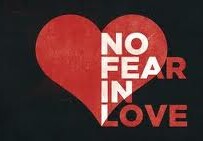Love vs Fear; Community vs Alone

When faced with any given situation, which root emotion do you act out of?
I have heard several people suggest that there are really two emotions that are at the root of everything we feel, and those are love and fear. Happiness, peace, joy, and serenity are all emotions that are rooted in love. Anger, hate, jealousy and even confusion are emotions that are rooted in fear. It is the impact of these emotions that drive how we respond to any given situation, and the good news is that we have choice. We have choice in how we react to any situation, and the choices that we make at the time are often based on how we perceive the situation at the moment it occurs.
If someone flies past you on the highway driving like a crazy person, you have an instantaneous choice in how you react. Acting out of anger might give rise to you flipping the driver the bird, or even worse you might start driving like a maniac yourself just so you can catch up to make sure that the person sees you flip him or her the bird. Alternatively, you could decide that this doesn’t really affect you at all and ignore the situation and continue to appreciate the rest of the moment for what it really is. That person just might be trying to get to the hospital to be with his dying mother … or he might drive like that all the time. The point is that you have choice in how you respond. If you choose the anger route, it will probably stay with you for some period of time, you’ll get yourself all worked up, and to what end? If you choose to act out of love and simply let it go, then you’re not burdened with any of those negative emotions to bring you down.
Two other comparisons of “love vs. fear” that come to mind for me are “community vs. alone”, and “cooperation vs. competition”.
Community vs Alone
When tasked with addressing a challenging problem, I believe that when we act in the fashion of “I can do this alone, I don’t need to ask for help”, we are acting from a form of fear. Even if we are ultimately responsible for the task at hand, I don’t believe that we have to go it alone. It is often the simplest “call for help”, something as tiny as sharing your thoughts and challenges with a friend or a colleague, that leads you to the answer that you need at that time. The answer might come from something your friend says, or simply speaking aloud yourself might switch on a lightbulb inside your own mind to give you the answer you’ve been looking for. And that approach virtually always leads to a better outcome than you would have come up with on your own.
I remember a situation at work where one of our smartest guys – he really was a rocket scientist – was showing obvious frustration at not being able to figure something out. My first thought was that if this guy couldn’t figure it out, how the heck would I be able to help him. But I approached him anyway and asked him to describe what was going on. He threw up his hands, shared some frustration and then started to tell me what was going on. As he talked, I listened and threw in a couple open-ended questions that he had to think through and describe. This was a complex problem and I had no comprehension of what he was describing. The discussion went on for a while, then after about 5 minutes he said without looking at me, “Thanks Ken”. Well I’m no rocket scientist but I’m pretty sure that the act of having him speak his problems out loud led him to look at the situation in a slightly different light to find the answer that he had inside him all along. He obviously felt relief and I must say that I walked away with satisfaction and a little smile on my face knowing that I had helped out a rocket scientist.
This to me is an example of the benefit of being part of a community. Working together and helping each other out is what we do best. I fundamentally believe that people actually want to help each other and the simple act of helping someone else puts us in a better frame of mind and leaves us more open to receiving help from others when we need it.
You hear it all the time, phrases like “you’re not in this alone”, and “we are all connected”. So shine a light on those fears, be they conscious or unconscious, and remember that you’re part of a community that is ready to help you when you need it.
If you’d like to share an interesting love vs fear story, send it along to [email protected].







Recent Comments